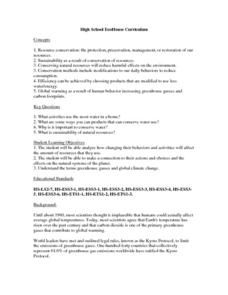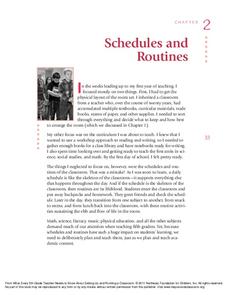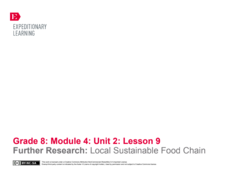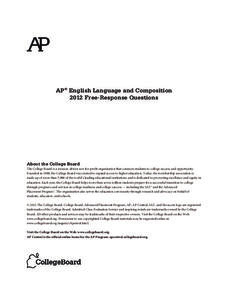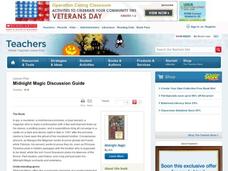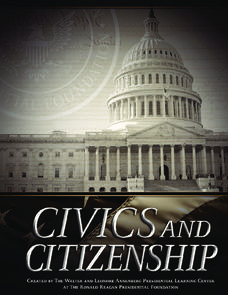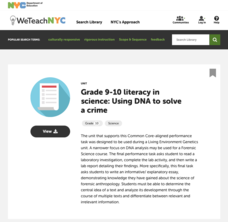Curated OER
High School EcoHouse Curriculum
How has the level of carbon dioxide changed over recent years, and what is contributing it? Groups work together to research and present their findings in a creative way. Also built into the lesson is a visit to a sustainable house, but...
Beyond Benign
Evaluating Sustainability and Lifecycle
What makes one product greener than another? Ecology scholars analyze sustainability and lifecycle through a thought-provoking activity. Individuals pick a product, then examine its components to determine its overall impact on the world...
EngageNY
Planning Content of Informative Consumer Guide: Sustainable Fishing Methods
There's no such thing as over-planning. In preparation for their informative consumer guides, scholars complete a Quote Sandwich graphic organizer to compile their information about sustainable fishing methods. Next, volunteers share...
Northeast Foundation for Children, Inc.
Schedules and Routines: Grade 5
Before diving head first into the year's curriculum, take time to establish clear routines and procedures for your classroom. Starting with how to set up a class schedule that meets the needs of fifth grade learners, this sample...
American Institute of Architects
Architecture: It's Elementary!—Fifth Grade
Young citizens construct an understanding of urban planning in this cross-curricular unit. Covering every aspect of city development from the political, economic, and social influences to sustainable building practices, this...
EngageNY
Further Research: Local Sustainable Food Chain
Researchers review how to create citations, find reliable sources, and paraphrase. Next, using guided task cards and their researcher's notebooks, they investigate the question they developed in instructional activity eight about the...
Pulitzer Center
Peacebuilding: Taking Home Lessons Learned in Africa
Learners take a closer look at one journalist's work on UN Peacebuilding efforts in four African nations: Sierra Leone, Burundi, Central African Republic, and Guinea Bissau. They collaborate to define peacebuilding and discuss...
WE Charity
High School–Module 3: Food Waste
Advances in packaging and refrigeration help keep food fresher longer. That's just one of the ways science is addressing global food waste. With the third of five lessons from the WE Are Innovators—High School Modules set, scholars use...
College Board
2012 AP® English Language and Composition Free-Response Questions
Neither rain nor snow nor heat nor gloom may keep postal workers from delivering the mail, but is their livelihood sustainable? A question about the USPS makes up one of the three items in a series of free-response questions from the...
Practical Action
Moja Island
Did you know that 1.3 billion people live without any form of electricity? Discover an array of possible renewable energy options by taking a trip to Moja Island, an online learning resource that will equip you and your...
WE Charity
High School–Module 4: Energy and Housing
What features make a home energy-efficient? Pupils attempt to answer the question with the fourth lesson plan from the five-part WE Are Innovators—High School Modules set. Scholars learn how certain building materials help save energy....
Wild BC
Is Climate Change Good for Us?
Is it really that big of a deal if the global climate undergoes a little change? Young environmentalists consider this very question as they discuss in small groups the impact of different climate change scenarios on their lives,...
Scholastic
Midnight Magic Discussion Guide
This discussion guide accompanies the fiction book Midnight Magic written by Avi, enforces story elements, inferences, and theme/plot. Have the class work on it over time, it will engage even your reluctant readers.
EngageNY
End of Unit 2 Assessment, Part 1A: Fishbowl on Better Use of Water in Agriculture
Just keep swimming! Pupils participate in a Fishbowl discussion, sitting in two concentric circles and alternating between speaking and listening roles. During the discussion, they defend a claim about the best way to begin managing...
American Museum of Natural History
What Do You Know About Astronomy
Develop an understanding of the universe. Learners answer 10 multiple choice questions about several topics in astronomy. Questions contain information about the age of the universe, gravitational attraction, galaxies, planets and comets...
EngageNY
Making a Claim and Advocating Persuasively: Preparing for the Practice Fishbowl
Scholars consider their reading in The Omnivore's Dilemma to develop a claim answering the question, "Which food chain would you choose to feed your family—the local sustainable food chain or the hunter-gatherer food chain?" To guide...
Government of South Australia
Don't Waste Your Energy
Don't lift another finger, this physical and environmental science unit has everything you need to begin teaching your class about energy. Starting with a look at the greenhouse effect, these lessons and activities take young scientists...
Out-of-School Time Resource Center
Nutrition and Physical Activity
Emerging nutritionists explore what it means to be healthy. In the beginning of the unit, your class will examine the five food groups and learn how food gets from the farm to our plates. This leads into the investigation of...
Beyond Benign
Ecological Footprint
How does your lifestyle measure up in terms of your ecological footprint? Young ecologists examine their impact on the planet using an insightful online calculator. A short quiz asks users to rank the size of their homes, their energy...
San Francisco Public Utilities Commission
Our Water: Many Users - Many Uses
California's water supply is not always stable. Learn about the ways that California weathers a drought with a reading activity about water usage and agriculture. Once kids finish the reading passage, they answer a series of...
New York City Department of Education
Peter’s Garden
Watch scholars' understanding of fractions bloom. The resource presents a performance task where the fractions are equal parts from the same whole, and mathematicians must use them to solve problems about a grade level garden. Teachers...
New York City Department of Education
Grade 8 Science: Genetic Modification of Organisms
Genetic modification is a hot topic in the science and political world. A complete unit gives learners an opportunity to research genetic modification, play an interactive genetic engineering simulation, and interact with the information...
Australian National Schools Network
Civics and Citizenship
What is a good citizen? Here is a fantastic unit of ten lessons that will thoroughly cover the concept of civics and citizenship in your class. Examples of activities include learning stations, primary and secondary source analysis of...
New York City Department of Education
Grade 9-10 Literacy in Science: Using DNA to Solve a Crime
Scholars become detectives and use science to solve a crime! A complete unit introduces DNA and includes hands-on activities that have learners model DNA and extract it from different food types. A culminating activity challenges...
